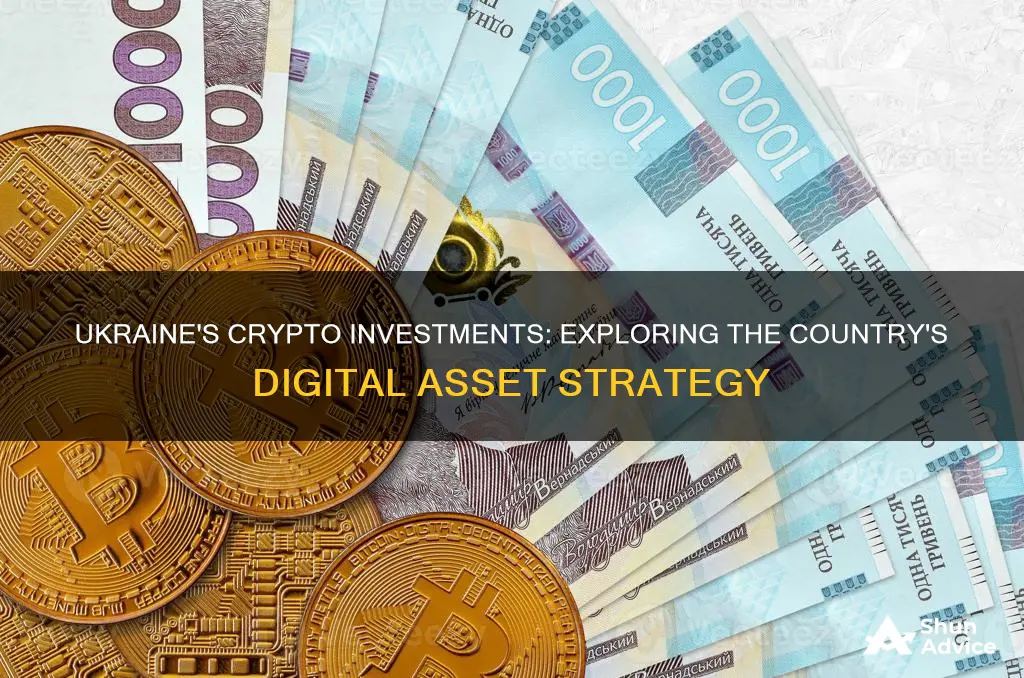
Ukraine has been actively investing in and utilizing cryptocurrencies, positioning itself to become a leading crypto hub and the premier crypto superpower. The country offers a favorable environment for the crypto industry, including low taxes, light paperwork, and a talented pool of engineers. Ukraine legalized virtual financial assets and began regulating them, aiming to attract foreign investment and establish itself as a top jurisdiction for crypto and blockchain companies. The Ukrainian government has also embraced digital transformation, introducing digital passports and driving licenses, as well as the world's fastest business registration process.
The conflict with Russia has had a significant impact on Ukraine's crypto ambitions. Border tensions and the military situation have created investor uncertainty, affecting the flow of foreign investment. However, cryptocurrencies have played a crucial role in providing financial support for Ukraine during the war, with the Ukrainian government securing millions in cryptocurrency donations. The widespread adoption of crypto in Ukraine has also been driven by a lack of investment opportunities, an inefficient banking system, and the desire for financial freedom and security.
| Characteristics | Values |
|---|---|
| Crypto Adoption Ranking | 4th or 5th |
| Daily Crypto Transaction Volume | $150 million |
| Crypto Donations to Ukraine | $60 million |
| Crypto Donations to Ukraine for Humanitarian Purposes | $134 million |
| Crypto Donations to Ukraine for Military Purposes | $91 million |
| Crypto's Role in Ukraine | Humanitarian Aid, Savings, and Transfers |
What You'll Learn

Ukraine's crypto donations
Ukraine has been positioning itself to be the main decentralized finance hub, not just of Eastern Europe but of the world. The country's offering as a crypto hub includes low taxes, light paperwork, and a surplus of highly talented engineers. In 2023, Ukraine ranked 5th on Chainalysis' Global Crypto Adoption Index.
Since the Russian invasion, cryptocurrencies have provided vital support for Ukraine. After the February 2022 full-scale Russian invasion, Ukraine experienced a run on its banks, a halt in the domestic currency market, and a steep devaluation of the Ukrainian hryvnia. Kyiv turned to digital currencies such as Bitcoin, Ethereum, and Tether, sharing wallet addresses on social media.
Ukraine's government bought weapons, unmanned aerial vehicles (UAVs), digital rifle scopes, and non-lethal tools with some of the $60 million in crypto donated after Russia invaded. Mykhailo Fedorov, Ukraine’s minister for Digital Transformation, tweeted a breakdown of expenditures, revealing that the government had used some of the $54 million worth of funds raised via crypto to purchase lethal weapons and launch an English news platform. Another $6 million was left to be spent.
Crypto donations to Ukraine have included over 102,000 cryptoasset donations, totaling $54.7 million, which have gone to the Ukrainian government and Come Back Alive, an NGO providing support to the military. Donations have also come in the form of non-fungible tokens and stablecoins like tether.
Ukraine believes it is benefiting more from leveraging crypto than Russia. Blockchain data analytics company Elliptic showed that private crypto fundraising for pro-Ukrainian causes had outpaced Russian equivalents by a rate of 44 to one in the first year of the war.
A Minor's Guide to Bitcoin Investment
You may want to see also

Crypto's role in the Russia-Ukraine war
Cryptocurrency has played a significant role in the ongoing Russia-Ukraine war, with both countries leveraging crypto in different ways. Ukraine has been able to raise tens of millions of dollars in cryptocurrency donations to support its war efforts and provide essential supplies to its military and citizens. On the other hand, Russia has been accused of using crypto to fund its war efforts and evade international sanctions.
Crypto as a Tool for Ukraine
Since the Russian invasion in February 2022, Ukraine has experienced a run on its banks and a steep devaluation of its national currency, the hryvnia. In response, the Ukrainian government turned to cryptocurrencies such as Bitcoin, Ethereum, and Tether, sharing wallet addresses on social media to solicit donations. This move proved successful, with Ukraine ranking fifth on Chainalysis' Global Crypto Adoption Index in 2023. By that year, the Ukrainian government had secured $225 million in cryptocurrencies and $190,000 worth of Ethereum-based non-fungible tokens (NFTs) through donations. These funds have been used for humanitarian purposes and to support the military, with crypto donations allowing Ukraine to receive funding instantly.
Additionally, Ukraine has a deep talent pool of developers, and its government has actively promoted the country as a crypto-friendly hub, legalizing crypto accounts in March 2022. This positioning has attracted foreign investment and contributed to Ukraine's ranking as one of the top countries in the world in terms of cryptocurrency use.
Crypto as a Tool for Russia
While crypto has been a lifeline for Ukraine, it has also been a concern due to its potential use by Russia to circumvent Western sanctions. Russia has been accused of leveraging crypto to fund its war efforts. Andrew Fierman, Head of Sanctions at Chainalysis, stated that "Russian entities have turned to crypto under the heavy pressure of international sanctions, using it for private militia group fundraising, continued ransomware attacks, and attempted sanctions evasion." Russian hacker groups have offered cryptocurrency rewards for effective cyberattacks, and pro-Russian groups have raised millions of dollars in cryptocurrency to buy ammunition, armor, and surveillance drones.
However, experts believe that Russia has been unable to use crypto on a large scale to evade sanctions. Attempts to convert large sums of currency into crypto would likely lead to liquidity problems, and Kremlin allies would face challenges in making purchases without converting crypto into standard currencies.
The Future of Crypto in the Conflict
As the conflict continues, the role of crypto is likely to evolve. While crypto donations to Ukraine have provided vital support, they remain modest compared to traditional financial aid. As Western aid falters, crypto donations to Ukraine have been decreasing, while Russia's crypto donations are on the rise, according to Elliptic.
The conflict has also brought the debate around crypto regulation to the forefront. The decentralized and underregulated nature of crypto has sparked concerns about its potential for illicit transactions, including sanctions evasion. Policymakers and global organizations are considering new regulations to address these risks while also recognizing the potential benefits of crypto, such as its ability to facilitate financial transactions in conflict zones.
Dogecoin Investment: Worth the Risk?
You may want to see also

Ukraine's crypto-friendly policies
Ukraine has been working towards becoming the world's premier crypto superpower and the main decentralized finance hub of Eastern Europe and the world. The country has implemented several crypto-friendly policies, which include:
Legalization of Virtual Financial Assets: In September 2021, Ukraine's government legalized Bitcoin and began the process of regulating virtual financial assets. This move provided a legal framework for the crypto industry and attracted foreign investment.
Granting Legal Status to Virtual Assets: Ukraine passed a bill recognizing the legal status of virtual assets, including cryptocurrencies and non-fungible tokens. This comprehensive approach towards regulating the virtual asset market boosts confidence and protects investors.
Paperless Regime: Ukraine has implemented a paperless regime, where public authorities cannot demand paper documents from citizens. This initiative promotes digitalization and simplifies interactions with government institutions.
Favorable Tax Planning: Ukraine offers excellent tax planning opportunities for crypto companies, providing incentives for businesses to register and operate in the country. These tax benefits make Ukraine an attractive destination for blockchain and crypto startups.
Digital Passports and Driving Licenses: Ukraine is one of the first countries to introduce digital passports and driving licenses with full legal recognition. This digitalization enhances efficiency, security, and accessibility for citizens.
Fast Business Registration: Ukraine boasts the world's fastest business registration process, taking just two seconds. This streamlined approach reduces bureaucratic hurdles and encourages entrepreneurship, including in the crypto space.
Strong Blockchain Community: Ukraine has a robust blockchain developer community, with startups like Bitfury, Hacken, and Propy founded by Ukrainian teams. This talent pool contributes to the country's crypto expertise and innovation.
Inclusion in the Global Crypto Adoption Index: Ukraine ranks highly on the Global Crypto Adoption Index, reflecting its widespread crypto usage. This recognition underscores Ukraine's position as a leader in cryptocurrency adoption and reinforces its appeal to international investors.
Bitcoin for Everyone? Exploring Average Joe's Investment
You may want to see also

Crypto as a savings method
Since the Russian invasion, cryptocurrencies have been a vital source of support for Ukraine, enabling the country to raise funds for humanitarian and military purposes. In 2023, Ukrainians were actively engaged in cryptocurrency transactions, receiving up to $850 million in the cryptocurrency market, according to the Ministry of Digital Transformation. Ukraine's success in the cryptocurrency sector has positioned it as one of the largest centres of cryptocurrency operations in Eastern Europe.
The popularity of cryptocurrencies in Ukraine can be attributed to several factors. Firstly, Ukraine offers a favourable environment for crypto investments with low taxes and light paperwork. Additionally, the country has a large talent pool of highly skilled engineers and developers, making it attractive for foreign investment in the tech sector. Ukraine's deputy minister of digital transformation, Oleksandr Bornyakov, emphasised the importance of regulation in attracting foreign investment in the crypto space.
The Ukrainian government has taken steps to legalise and regulate virtual financial assets, recognising their potential to attract foreign investment and strengthen the country's image as a high-tech state. Mykhailo Fedorov, Ukraine's vice prime minister of digital transformation, highlighted the benefits of developing the crypto industry, stating that it would attract transparent investments.
The success of Ukraine's crypto initiatives is reflected in its ranking on the Global Crypto Adoption Index by Chainalysis. In 2023, Ukraine ranked fifth, with an estimated $8 billion worth of cryptocurrency entering and exiting the country annually. The daily volume of cryptocurrency transactions stands at around $150 million, exceeding the volume of interbank exchanges in the fiat currency, the hryvnia.
The use of crypto savings accounts has also gained traction in Ukraine. These accounts allow investors to earn interest on their crypto assets, typically stablecoins like USDC. While the specific mechanisms may vary, the general idea is that investors deposit their crypto assets and receive interest in the same or different crypto assets. Popular cryptocurrencies like Bitcoin (BTC), Ethereum (ETH), and stablecoins such as Tether (USDT) and USD Coin (USDC) are commonly accepted in these accounts.
It is important to note that crypto savings accounts come with certain risks and considerations. Unlike traditional savings accounts, they do not have FDIC or NCUA insurance. They often use simple interest calculations and impose restrictions on withdrawals, especially during times of turmoil. Additionally, the value of the underlying crypto assets can be highly volatile, impacting the overall returns.
Despite the risks, crypto savings accounts can offer higher interest rates compared to traditional savings accounts. For example, BlockFi, a lending company, offers variable rates of up to 11% annual percentage yield (APY) on stablecoins. Popular coins like Bitcoin and Ethereum typically have lower interest rates of around 3%.
In conclusion, crypto savings accounts have become an attractive option for investors in Ukraine and worldwide, providing an opportunity to earn interest on crypto assets. However, it is essential to carefully consider the risks and volatility associated with these accounts before investing.
Propy Coin Investment: Worthwhile or Risky Venture?
You may want to see also

Crypto's potential future in Ukraine
Ukraine has been positioning itself to be the main decentralized finance hub, not just of Eastern Europe, but of the world. In September 2021, the Ukrainian government legalized Bitcoin, and in March 2022, it legalized crypto accounts, authorizing accounts for crypto companies and allowing a surge in donations.
The country has a lot going for it in its bid to become a crypto superpower. It has low taxes, light paperwork, and a surplus of highly talented engineers. It is also ranked highly for the percentage of cashless payments in the world, and it has a strong blockchain developer community.
However, the conflict with Russia has put a spanner in the works. More than 100,000 Russian troops amassed at the border, and the media reporting on them has not helped Ukraine's crypto ambitions. The border tensions "increase risks that were already high, and people by nature will go to more safer options," said Illia Polosukhin, the Ukrainian cofounder of NEAR Protocol, a decentralized application platform.
Despite this, Ukraine has continued to make use of cryptocurrency during the war. In 2022, the Ukrainian government set up wallets on Kuna and other exchanges to accept donations to the war effort in crypto, and in April that year, Bloomberg reported it had received over $60 million in crypto donations.
Cryptocurrency has also been used within Ukraine as a means of payment for large transactions, as well as for savings and transferring money within the country.
The future of crypto in Ukraine looks bright, despite the current crisis. Ukraine has a lot of political power right now to create the first crypto state, and with the support of many in the government, it is well-placed to become a major player in the world of decentralized finance.
El Salvador's Bitcoin Gamble: Millions Invested
You may want to see also
Frequently asked questions
According to the Ministry of Digital Transformation, Ukrainian citizens earned up to $850 million from cryptocurrencies in 2023.
Ukraine has been positioning itself to be the main decentralized finance hub, not just in Eastern Europe but globally. The country has embraced crypto assets and granted them legal status.
Cryptocurrencies have provided vital support for Ukraine during the war. The Ukrainian government set up wallets to accept crypto donations for the war effort, receiving over $60 million. Additionally, crypto has been used for humanitarian aid, savings, and transactions within the country.
Cryptocurrency offers a way to circumvent the country's unstable banking system and conduct transactions without relying on traditional financial institutions. It also provides a means to store value and make payments outside of Ukraine, as the local currency and foreign exchange market are unstable.
The use of cryptocurrency in Ukraine also comes with risks, such as the potential for misuse by bad actors. There are concerns about the stability of stablecoins, such as Tether (USDT), which is widely used in Ukraine. Additionally, the lack of regulation and the volatile nature of crypto can make it a risky investment option.







